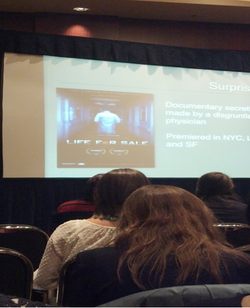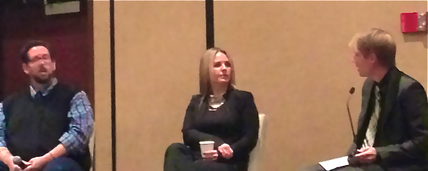PRSSA National Conference Review: The Importance of Reputation Management in Healthcare PR1/29/2014  by Bobby Batyko Reputation management is key across all fields of public relations, but what impact does it have in the healthcare field? From status quo operations to hospital-wide emergencies, establishing and keeping a reputable public image is critical. That’s an important job and is what Christopher Brown, director of marketing for Stanford Hospitals, does every day. When I attended his session at the 2013 PRSSA National Conference, it was an introduction to the world of healthcare PR. During the presentation, he gave two specific examples that shed light on exactly what his job entails. Managing a Crisis Brown’s first example involved a crisis resulting from the documentary Life for Sale. The documentary was a scathing review of Stanford Hospitals and alleged wildly unethical practices, including profiting at the expense of patients’ health. The marketing department at Stanford quickly researched the claims made. Within hours of the films release, Brown began contacting newspapers and clarifying the truth. Nearly all of the claims made were either completely false or greatly distorted from reality. The legal department quickly became involved and began taking action against the makers or the film for multiple illegal actions taking during the making of the film. After only 48 hours of the first public viewing of the film, critical backlash turned tides from the hospital system to the documentary itself. In terms of analyzing what took place, the incident demonstrated how effective crisis planning could impact such an event. The hospital had an effective system for dispersing key talking points, was able to quickly produce factual information and had well-established relationships with reporters. While this response plan was certainly effective for a healthcare provider, it is a model that benefits nearly any organization with a public following. Dealing with the Press Brown’s second example involved showcasing a new type of open heart surgery. A number of journalists were in the room observing the surgery along with video and audio recording equipment. Unfortunately, things took a dramatic turn for the worse during the procedure. The patient experienced a very serious complication and ended up passing away suddenly. When the doctors stepped away from the table, Brown had a decision to make: Should he remove the journalists from the room as soon as possible while asking that all recording equipment be turn off, or should he let the press witness what happened next? He chose to pursue to latter. Instead of writing a story about how a patient died during a heart procedure, the journalists wrote about the unmatched professionalism of Stanford Hospital doctors when little hope remained for the procedure’s success. This action, or rather choice of inaction, completely altered what could have been a PR crisis. It is difficult to think strategically during a split-second, unexpected disaster. However, when effectively made, these decisions can stop a worst-case scenario. To say the absolute least, the session gave a phenomenal look into what healthcare PR is like. From long-term reputation management to handling unpredictable emergency situations, there simply isn’t a dull day on the job.
0 Comments
 by Kirsten Bowers Building relationships is important in PR. I mean, it’s in our job title: public relations professional. Building relationships with both the media and with your coworkers is especially important in the entertainment industry because those relationships can lead you down the road to success in your first job in public relations. This is what I learned when I attended the session “The World of Entertainment PR with Warner Bros. Television” at the PRSSA National Conference in Philadelphia last fall. The session was led by Damian Holbrook, senior writer for “TV Guide Magazine;” Tammy Golihew, senior vice president of publicity at Warner Bros. Television; and Jeff Tobler, director of publicity initiatives at Warner Bros. Television. The trio addressed the working relationship of entertainment PR professionals and journalists as well as finding your first job. Working with the Media
Picking a Job and Launching Your Career
Need advice? The panelists provided two more suggestions you should follow as you complete your college career:
|
Archives
February 2024
Categories
All
|
 RSS Feed
RSS Feed
